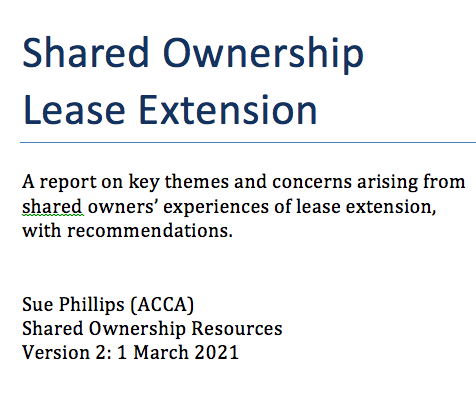Shared owners want staircasing and lease extension to be genuinely affordable…
I asked people who’ve purchased shared ownership homes about their experiences of lease extension – via social media – and compiled the responses into a formal report with recommendations for improving shared ownership. This is the second of three articles summarising themes from that report and covers statutory and informal routes to lease extension, and staircasing.
The first article focused on:
- valuation fees; and
- lease extension premiums.
The final article will focus on:
- selling shared ownership homes; and
- schemes for over 55s.
An ad-hoc informal approach can’t substitute for well-funded, rigorous research. Nonetheless, some key themes and distressing stories emerged which warrant greater attention. A selection of quotes from shared owners – and some key recommendations – follow. The full report can be downloaded at the end of this feature.
Shared owners say:
“There was no advice either from my solicitor (I used one recommended to me by [my housing association] when I purchased) or [my housing association] about the need to extend a lease or any associated information at all regarding this aspect of being a home-owner / leaseholder.”
“The biggest shock to me was finding out that, as I do not own 100% of the flat, by law the housing association can refuse to extend my lease. I find this is truly shocking. It makes me feel very nervous about applying to extend the lease as I feel they have all the power and can ask for whatever amount they want without me being in a position to argue and negotiate with them.”
“I think that you need to have owned 100% for at least 2 years before you can use the formal route to extend the lease, so for all the shared owners still here, time is ticking down and I really hope there will be changes soon. So far I am not aware of any shared owner using their ‘voluntary’ route and the residents’ associations has always advised against this explaining that they will then have the extra ground rent charge, but if the law doesn’t change soon I expect they will have to use this route to extend eventually rather than let the lease fall under the 80 years.”
“[Our housing association] sold them with a 99 year lease so we are aware leaseholders will have to extend soon. Some, who own a 100% share now have already done this using the formal route. We have always advised not to use the [housing association] voluntary route but for those who don’t own 100% this is their only option at the moment, and introduces ground rent which we don’t pay at the moment. The ground rent on the 999 year head lease is £1 per annum. Leaseholders have been hanging on hoping for changes to the law before it affects them, but this year there will be only 84 years left on the lease so some are starting to worry.”
“I’d have extended the lease years ago if I realised what it all was. I’m a careful person and feel I’ve been had. Now waiting for 2 years before I can do the formal route and hoping laws will get to change by then. All housing associations want is money – change a bathroom £100, change a kitchen £100, and get nothing back for all the improvements I’ve made.”
“I think most shared owners would be extending with the view to making their flat more saleable than looking to staircase now. We still have a good number of original owners here on shared ownership and the increased value of their homes from initial purchase in 2010 / 2011 probably makes staircasing now too expensive for regular waged people.”
“Lease extension not possible unless you have 100%, can’t afford the last 25% as I am a pensioner. Can’t sell because lease is close to 80 years, can’t live in flat due to health, can’t afford to leave empty, had to sublet but desperate to sell, vicious circle.”
Key Recommendations
- Shared owners pay only their proportionate share of the lease extension premium (and of all costs).
- Lease extension to 990-years with ground rents reduced to peppercorn as standard for all shared owners; with retrospective application for legacy shared owners with short leases for an affordable, nominal, flat fee of not more than £2,000.
- The Zucconi precedent (a change in the method for calculating the cost of leasehold premiums once fewer than 80 years remain on the lease, which can more or less double the cost compared to pre-Zucconi) not to be taken advantage of with immediate effect, with recompense to shared owners who’ve already paid a lease extension fee calculated taking advantage of the Zucconi precedent.
Additional Recommendations
Formal (Statutory) and Informal Routes
Shared owners report not being provided with full information at the outset regarding restrictions on access to the formal route; albeit arising from the nature of the specific scheme itself (staircasing capped below 100%) or simply the statistical unlikelihood of progressing to 100% staircasing which provides access to formal route. Shared owners are often encouraged, or effectively obliged, to use the housing association’s own appointed lease extension valuer. In other cases, conflicting advice from housing associations and independent solicitors causes confusion.
- Full transparency about risks and benefits of informal and formal routes.
- Robust and transparent controls to ensure and demonstrate valuer independence and competence.
Leasehold Extension and Staircasing
The inter-relationships between leasehold extension and staircasing aren’t always made clear to first-time buyers and shared owners. For example, it may not be apparent that lease extension will – all things being equal – increase the cost of future staircasing by increasing the value of the property.
- Transparency on potential cost and implications of lease extension, and signposting to relevant sources of information.
Click on the text below to open the full report.

Be First to Comment